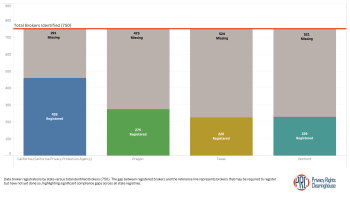Employment
Your privacy shouldn't end when you clock in. Employers increasingly gather personal data—from workplace surveillance and location tracking to background checks and drug tests.
Protecting Your Privacy at Work
Your workplace should respect your privacy rights, even as they manage their own legitimate interests. Employers collect data in many ways—surveillance cameras, email monitoring, location tracking, and even biometric and health information. Understanding what data employers collect, your rights under relevant state and federal laws, and how to respond if your privacy is violated is critical.
It is our goal to help you understand your rights and navigate the balance between workplace demands and your privacy. Below, we've outlined key privacy concerns that workers face, practical steps you can take, and resources to help navigate complicated privacy issues in employment.
What You Need to Know
Yes, employers generally have the right to monitor emails and internet use on company-owned devices or networks, especially if they have a clear policy informing employees of this practice. The Electronic Communications Privacy Act (ECPA) allows workplace communications monitoring for legitimate business purposes, and courts have upheld that employees typically do not have a reasonable expectation of privacy in work emails or browsing history. Even personal email accessed on a work computer may be logged.
However, some state laws offer additional protections. In California, for example, the state’s constitutional right to privacy may limit excessive or undisclosed monitoring. A few states, like New York, require employers to notify employees if they monitor email or web activity. Personal devices used for work (under "Bring Your Own Device" policies) may have some protections, but always check your company’s IT policy before assuming privacy.
Employers are allowed to use video surveillance in the workplace for security or productivity reasons, but not in private areas like restrooms, locker rooms, or break rooms. California law specifically prohibits secret recordings in areas where employees expect privacy. Surveillance should generally be disclosed, and hidden cameras in break areas or offices may violate state privacy laws.
Audio recording is more restricted—many states, including California, require all-party consent to record conversations. Employers may also use keystroke logging or biometric tracking, but some states, such as Illinois (BIPA) and Texas, require written consent for biometric data collection. If you suspect overly intrusive surveillance, you can ask your employer about their monitoring policy or seek legal guidance.
Yes, employers can conduct background checks, but they must follow the Fair Credit Reporting Act (FCRA) if using third-party screening services. This means they must get your written consent and inform you if the report is used to deny you a job. Some states, including California, also limit how far back criminal records can be reported.
Employers generally cannot ask about arrest records that did not lead to a conviction, sealed records, or expunged offenses. They can look at public information, including social media, but many states (like California and New York) have laws prohibiting employers from demanding access to private accounts. If you believe an employer used discriminatory hiring practices based on background information, you can file a complaint with the EEOC or state labor agency.
Under the Americans with Disabilities Act (ADA), employers cannot ask about medical history or require medical exams before making a job offer. After an offer is made, medical exams can be required only if they are job-related and required for all employees in similar roles. Employers must keep medical information confidential and separate from other HR records.
Once you are employed, medical inquiries are very limited—they must be directly related to job performance or workplace safety. California law provides additional protections under the Confidentiality of Medical Information Act (CMIA), which requires employers to keep any medical data secure. If you believe an employer is unlawfully asking about your medical history, you can file a complaint with the EEOC or state labor department.
You have a right to privacy in personal areas (bathrooms, break rooms, etc.), but in most workplaces, employers can monitor common areas and workspaces for security reasons. Employers should disclose surveillance, and in some states (like Connecticut and Delaware), they are legally required to notify employees of electronic monitoring.
In California, excessive or secret monitoring may violate the state’s constitutional privacy rights. Audio recording is more restricted—in states like California and Illinois, employers cannot record conversations without the consent of all parties. If you are concerned about workplace surveillance, ask for written policies on monitoring and, if necessary, consult a labor attorney.
It depends. In at-will employment states, refusing surveillance may lead to termination unless the monitoring violates the law. For example, if an employer requires biometric tracking, states like Illinois (BIPA) and Texas require written consent, and you have the right to refuse. In California, employees may challenge surveillance as a privacy rights violation if it is excessive or not job-related.
You have stronger rights if surveillance affects off-duty conduct. Courts have ruled that GPS tracking outside of work hours can violate privacy rights. If you believe surveillance is unlawful or invasive, consider filing a complaint with your state labor board or seeking legal advice.
If you think your privacy rights have been violated, start by reviewing your company’s policies and filing an internal HR complaint. If that does not resolve the issue, you can file a complaint with the following agencies:
- EEOC (Equal Employment Opportunity Commission): For medical privacy, disability rights, or discrimination issues.
- State Labor Departments: For state-specific workplace privacy protections (e.g., California Labor Commissioner).
- Federal Trade Commission (FTC): For improper use of background checks under FCRA.
- National Labor Relations Board (NLRB): If surveillance is used to monitor or retaliate against workers discussing wages or unionizing.
More Resources



